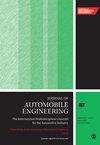城市线路混合动力电动公交车的多目标能源管理优化
IF 1.5
4区 工程技术
Q3 ENGINEERING, MECHANICAL
Proceedings of the Institution of Mechanical Engineers Part D-Journal of Automobile Engineering
Pub Date : 2024-07-30
DOI:10.1177/09544070241265773
引用次数: 0
摘要
电气化汽车的发展是实现节能、减排、环保和更可持续经济增长的重要一步。就混合动力电动汽车(HEV)而言,能源管理策略(EMS)对其效率和能耗至关重要。通常情况下,EMS 采用基于规则的策略,并根据一般驾驶条件进行校准。因此,本文建议利用以往的驾驶信息,校准城市混合动力电动公交车的能源管理策略。EMS 可计算出必须由每种能源(燃料和电池)提供的车辆电力需求百分比,还可控制供暖、通风和空调系统,以实现车厢内的热舒适度。所提议的方法基于在公交车在所考虑的路线上所覆盖的前一个环路中通过动态编程采用最优解决方案。然后,通过应用单步前瞻滚动,利用线路中环路的相似性,将成本-去程矩阵存储并用于后续行程。为了比较和评估所提算法的性能,在暖通空调控制系统中采用了广泛的等效消耗最小化策略(ECMS)方法,并结合基于规则的策略进行了基准测试。最后,帕累托前沿显示了机舱温度控制性能与总油耗之间的权衡,从而对不同的 EMS 校准进行了比较和评估。本文章由计算机程序翻译,如有差异,请以英文原文为准。
A multi-objective energy management optimization for a hybrid electric bus covering an urban route
The development of electrified vehicles is a promising step toward energy savings, emissions reduction, environmental protection, and more sustainable economic growth. In the case of hybrid electric vehicles (HEVs), the energy management strategy (EMS) is essential for their efficiency and energy consumption. Typically, EMS employs rule-based strategies calibrated to general driving conditions. So, this paper proposes to calibrate the EMS of an urban hybrid electric bus that covers a particular route by taking advantage of past driving information. The EMS computes the percentage of the vehicle power demand that must be supplied by each of the sources (fuel and battery) and also controls the heating, ventilating and air conditioning (HVAC) system to achieve cabin thermal comfort. The proposed approach is based on employing an optimal solution by dynamic programing in a previous loop covered by the bus in the considered route. Then, the cost-to-go matrix is stored and used in the following trips by applying the one-step look-ahead rollout, taking profit from the similarities of the loops in the route. To compare and evaluate the performance of the proposed algorithm, a benchmark was carried out by employing the widespread equivalent consumption minimization strategy (ECMS) approach, combined with rule-based strategies in the HVAC control system. Finally, the pareto front presents the trade-off between cabin temperature control performance and total fuel consumption, allowing to compare and evaluate the different EMS calibrations.
求助全文
通过发布文献求助,成功后即可免费获取论文全文。
去求助
来源期刊

CiteScore
4.40
自引率
17.60%
发文量
263
审稿时长
3.5 months
期刊介绍:
The Journal of Automobile Engineering is an established, high quality multi-disciplinary journal which publishes the very best peer-reviewed science and engineering in the field.
 求助内容:
求助内容: 应助结果提醒方式:
应助结果提醒方式:


